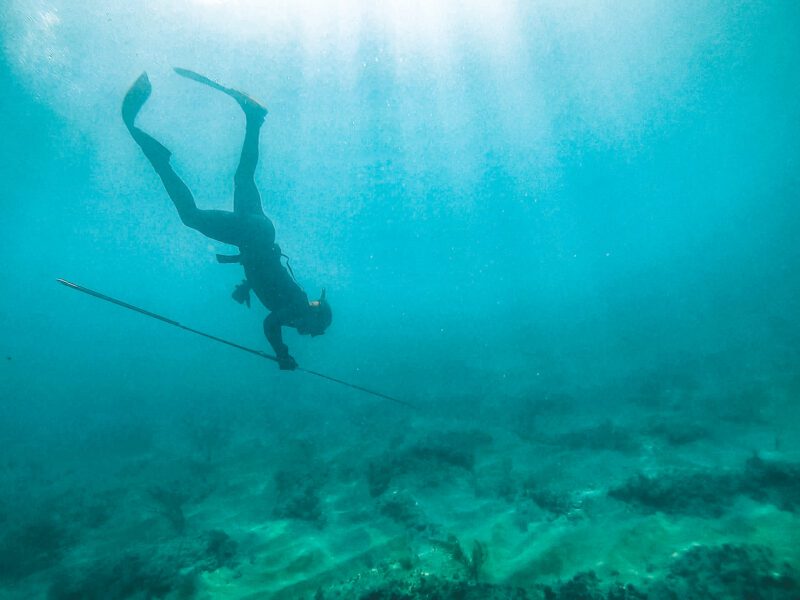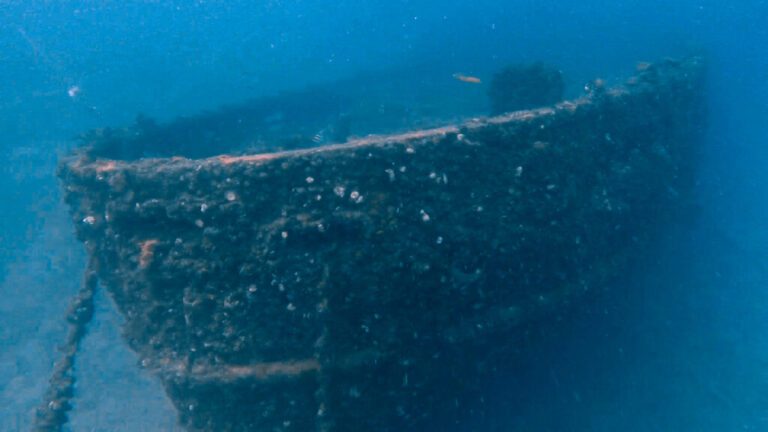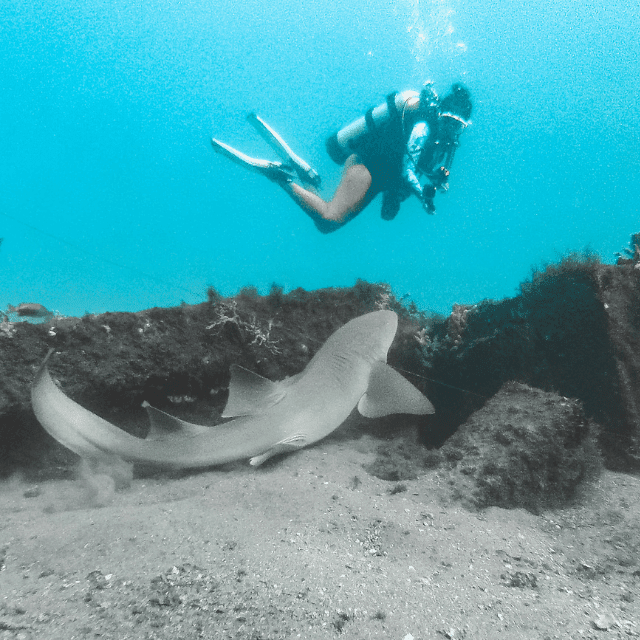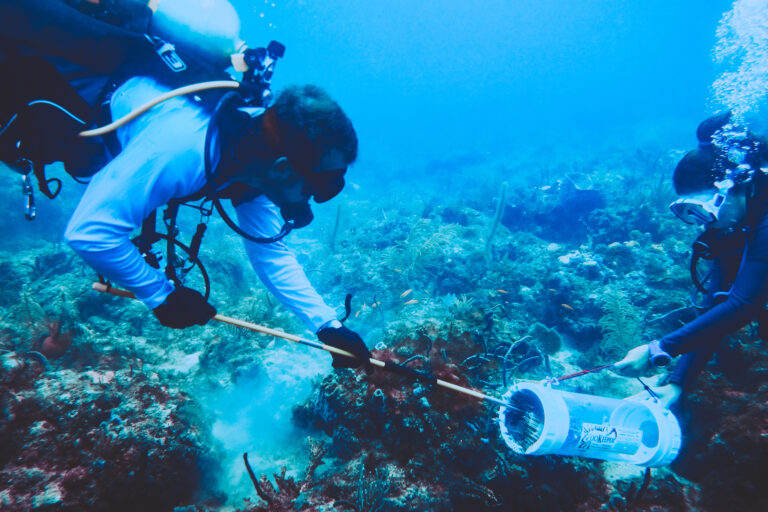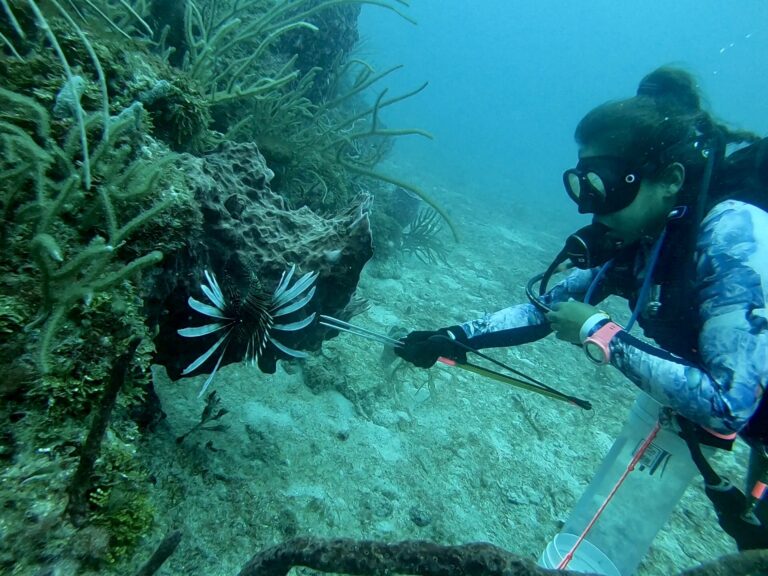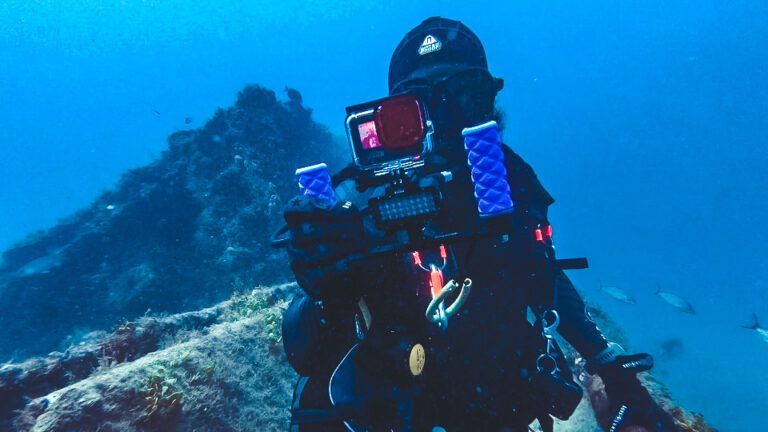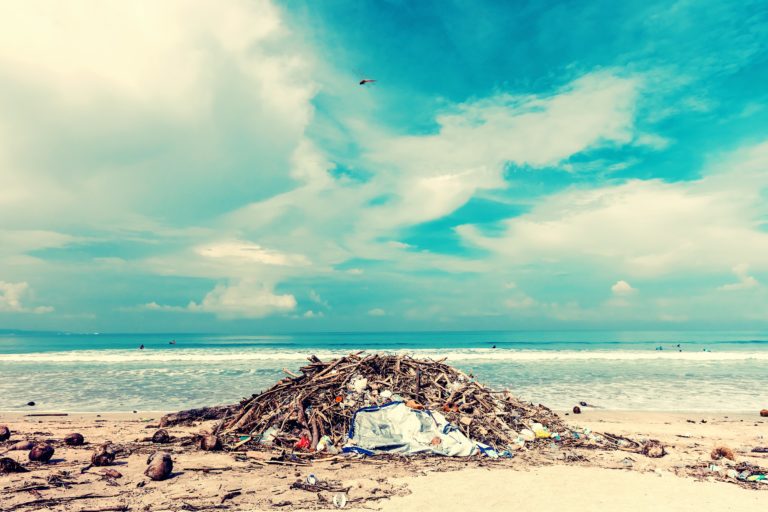Becoming the Predator: Are Instincts Why We Hunt Lionfish?
When asked why we hunt lionfish, many divers will tell you about all the negative effects the invasive species is having on our environment. And they’re right. But is that the only reason we hunt lionfish? Or could it be something deeper?
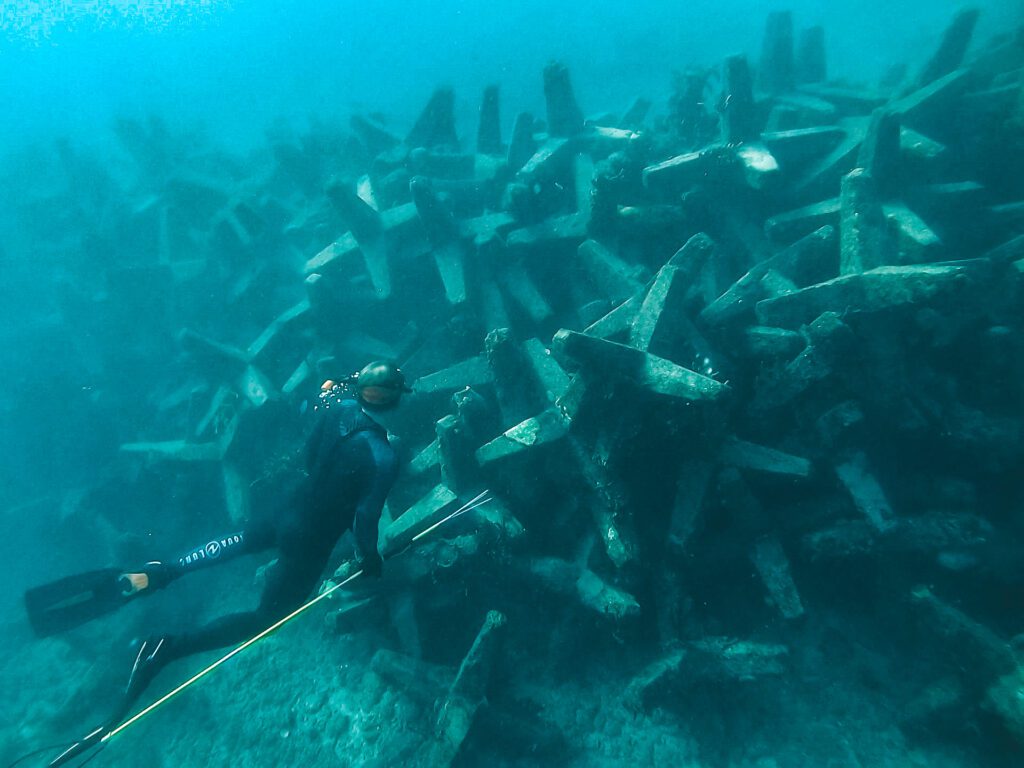
“Why do some people respect every predator, but themselves?”
Steve Rinella in stars in the sky: A hunting Story
The paradox with hunting an invasive species.
Lionfish are the perfect invader in the Western Atlantic. Why?
- They have no natural predators.
- They reproduce exponentially.
- And have an insatiable appetite.
The result? Dwindling native fish populations leading to coral reef devastation. It’s a perfect storm for an explosive invasion. It’s true – they need to be removed. The fewer the numbers, the better. A fine, environmental cause.
So naturally, right on cue, scuba divers in the Western Atlantic have taken it upon themselves to remove this invasive species. Equipped with a pole spear and containment unit, divers have been culling lionfish for years in the name of the environment.
However, my first realization that hunting lionfish may be rooted in a deeper meaning occurred during an Instagram interaction (of all places) with a fellow spearfisherman. We both expressed disappointment when our dives came up empty handed while searching for lionfish. Neither of us encountered any.
This should be a good thing. Right? Environmentally speaking, it’s a great thing! But why was I still feeling disappointed? It made no sense. If I was hunting lionfish strictly for environmental purposes, why were my emotions dissenting from the cause?
Think about it, have you ever felt this way after a failed lionfish cull? If our motives are purely environmental, a failed lionfish hunt is a successful hunt. It’s paradoxical by nature.
Unless, we have a deeper motivation beyond saving the environment (a noble cause and something we all do care about, of course) that drives us to hunt lionfish. But maybe, in fact, we’re also trying to satisfy something within ourselves.
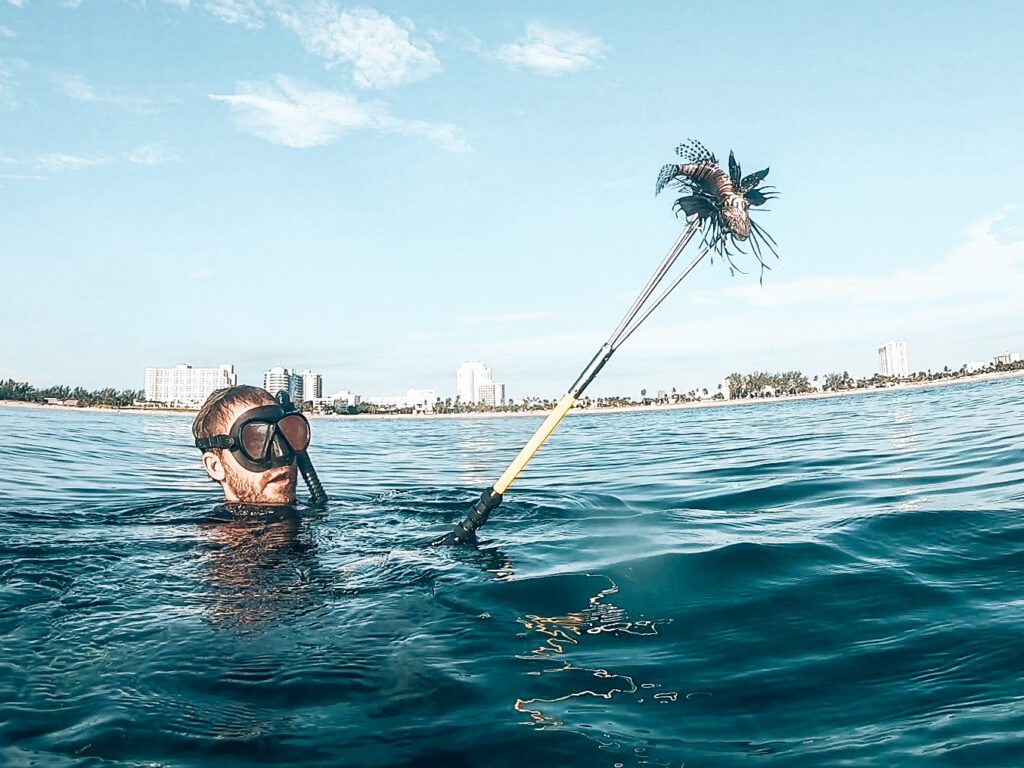
Common reasons given why we hunt lionfish.
The main reasons why we hunt lionfish are incredibly well-founded. We’ve discovered that the most common answers divers give when asked about their hunting efforts are:
- “They’re invasive. So we need to remove them.”
- “Lionfish are incredibly tasty.”
- “Eating lionfish is more sustainable compared to other options.”
- “Hunting lionfish helps the environment and saves the coral reefs”.
- Amongst other reasons, too.
Who can criticize any of those reasons? They’re all exactly right – backed by nature, science, logic and reason. But yet, I’ve come to wonder in recent days, are those the only reasons we hunt lionfish? Or could we be looking to satisfy a deeper instinct within each of us?
It’s difficult to say, because nobody would tell you otherwise. But I believe divers seek to remove lionfish to satisfy an instinctual desire to hunt.
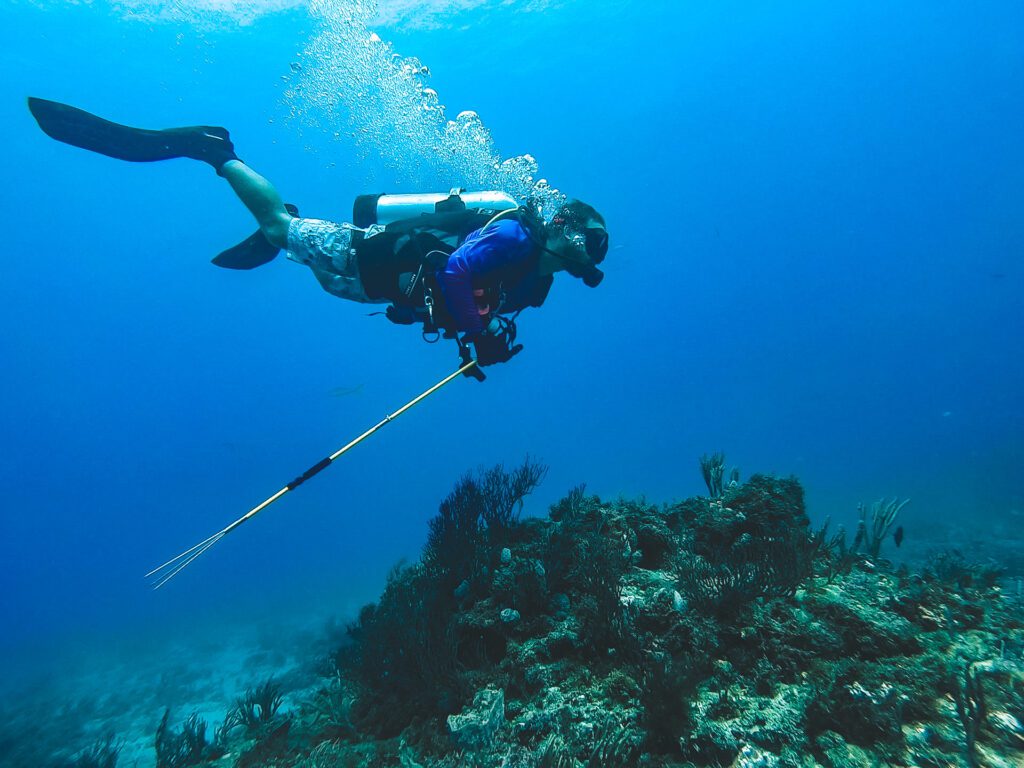
Removing lionfish satisfies a natural instinct.
Hunting has played an integral role in our evolutionary history – it’s more human to hunt than not to. And in a world that becomes increasingly contentious towards hunting, lionfish provide ocean lovers a means to satisfy this instinct that’s scientifically, socially and culturally accepted.
This is not a criticism against those reasonings, either. But rather, those well-founded factors provide a foot in the door – a way in to something we’ve lost. To something we’ve been told is bad.
And no, this is not a case for barbarism – a satisfaction for some sort of bloodlust. That’s not a real hunter. A true hunter has a deep respect for nature, the animals within it and the nourishment they can provide. A true hunter is willing to face the understanding that for us to live, something must die.
Invasive lionfish allow humans to be hunters again.
The idea of not hunting is new – dating back just a generation or so. Modern technology, factory farming and agriculture have enabled a disassociation between us and where we source our food.
This leads to the common misconception portraying hunters as barbarians seeking bloodlust. A logical conclusion for a society whose food magically appears in neat rows at the local supermarket.
Truth is, humans have hunted for as long as we’ve roamed the earth, with evidence dating as far back as 2 million years ago. More recently, humans have been hunting the Americas for the last 13 thousand years after crossing the Bering Strait. Hunting is apart of our DNA.
To put it in perspective, anti-hunting has only gained ground in the last 50 years or so. Certainly, YouTube and trophy hunters have done us no favors. The inevitable result? A culture that looks down on hunting. A socially aberrant activity.
However, lionfish have given us a way back in. A justification for dipping our feet back into whence we came.
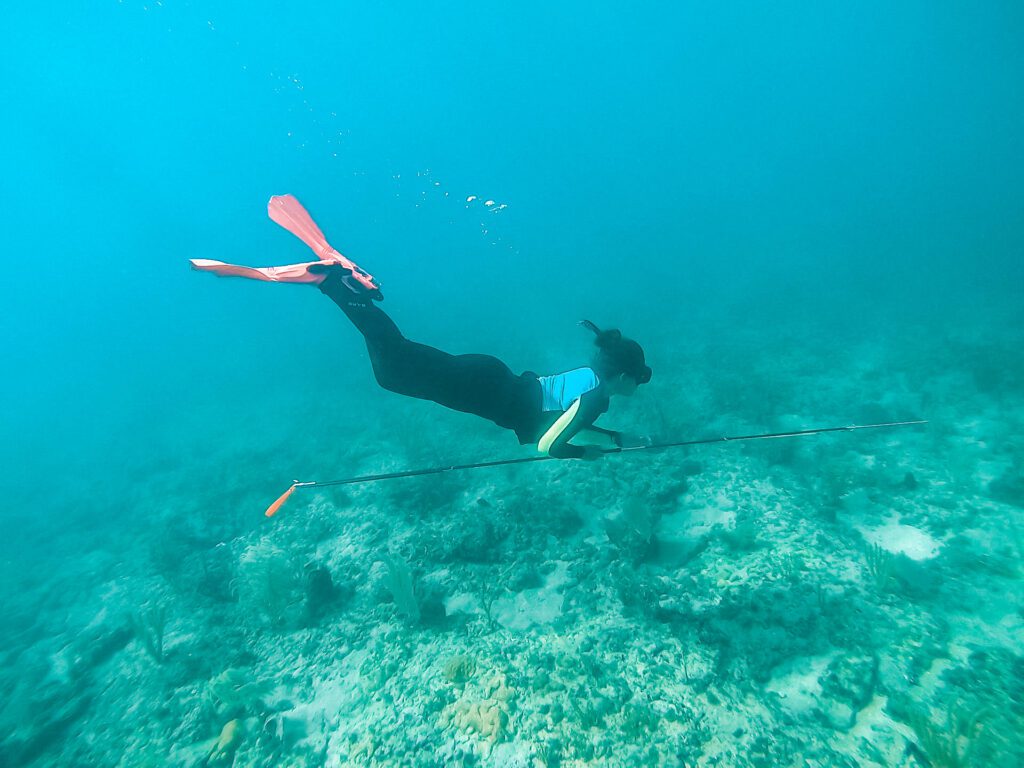
A foot in the door to an ocean with just a few doors left.
The state of our oceans have made it nearly impossible for an underwater hunter to thrive like we used to. Temperatures are warming, fish stocks are decreasing, marine life is dying. In fact, a 2015 report by the World Wildlife Fund found nearly 50% of marine life in the world has died in the last 40 years alone.
A horrifying statistic.
This has resulted in, and rightfully so, a major push back from ocean-loving communities. Unsustainable commercial fishing, spearfishing and individual anglers are castigated. It’s become socially and culturally reprehensible to hunt in our ocean.
So how does a hunter react? Like every good predator does, of course. We adapt.
Yes. We do remove lionfish to help the environment. And as such, lionfish are viewed socially and culturally in a different light. People cheer when we kill them. It’s a good thing. But in turn, we use this as a justification to hunt again. A means to satisfy those primal instincts while maintaining positive social status. After all, science is on our side.
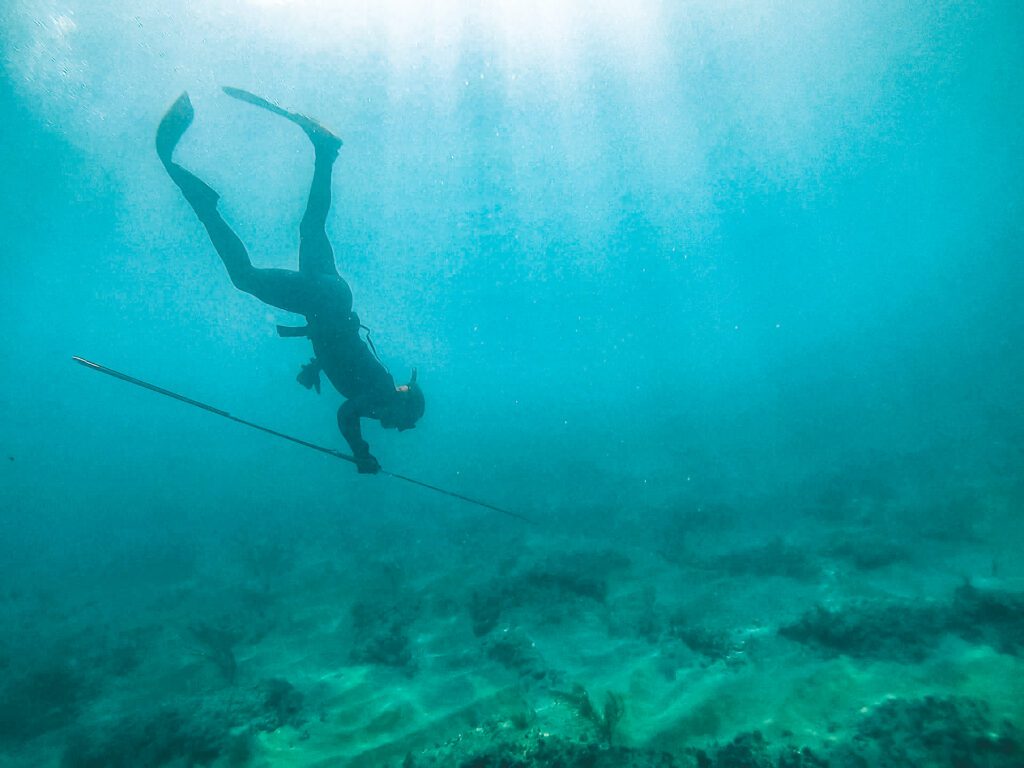
A hunter respects nature and the animals they seek.
A common criticism of hunting is the violence. And truly, it is hard to get past. By nature, we are committing violent acts against another creature. Some opposers go as far as stating that we hunt to satisfy a bloodlust.
So the question is, are we hunting lionfish merely to satisfy this desire to kill? Are we using environmental reasons as a masquerade to quench our thirst for blood?
Above, I’ve argued that we hunt lionfish to satisfy our instinct to hunt. Now, that is completely different from barbarism. Hunting comes from a place of respect, dignity, love and connectivity with nature. You’ll never feel as close with nature until you harvest your food directly from it – lionfish included.
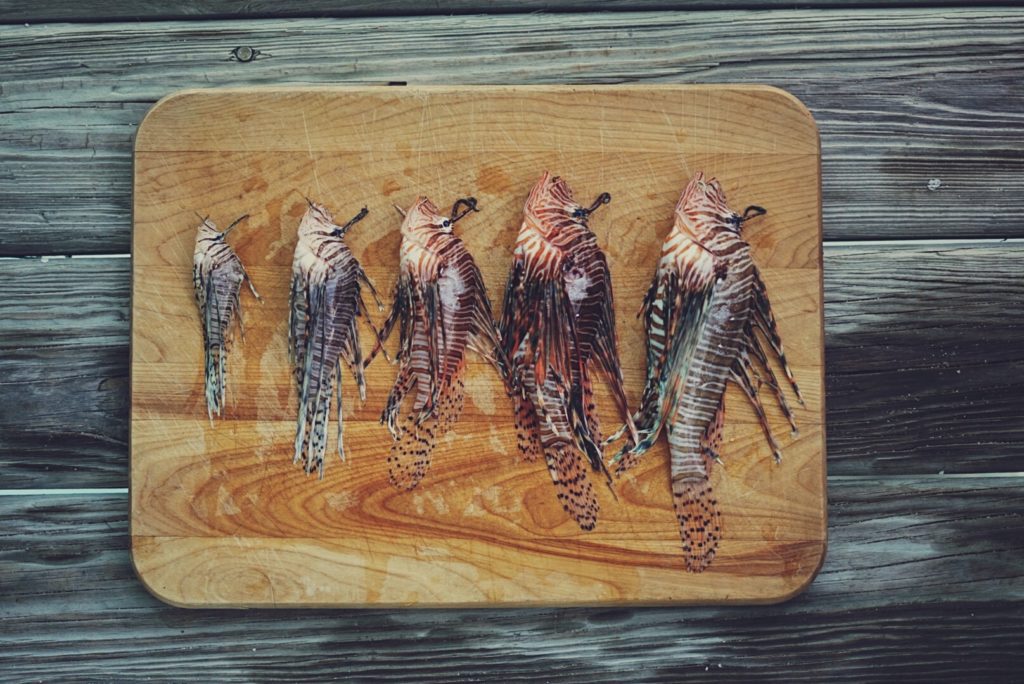
Rationalizing the violence.
It is a natural truth that in order for something to live, something else must die. It’s true from the phytoplankton in the ocean to the plants in your backyard. And it’s just as true for humans as anything else. It’s the circle of life, as some might say.
Again, technological advancements and our cozy lifestyles of the modern world have enabled a disassociation between ourselves and the source of our food. Store-bought meat is possible after an incredible amount of violent acts have been inflicted against animals – we just don’t see it.
Fruits and vegetables sourced from non community gardens are not immune to this either. Monoculture and pesticides, among other things, are extremely detrimental to wildlife – killing animals off by the millions.
A hunter has come to grips with this natural truth. A hunter understands that in order for us to live, something else must die. And with that understanding, a hunter rationalizes the violence that must occur for human prosperity. A hunter just chooses to bestow it upon themself.
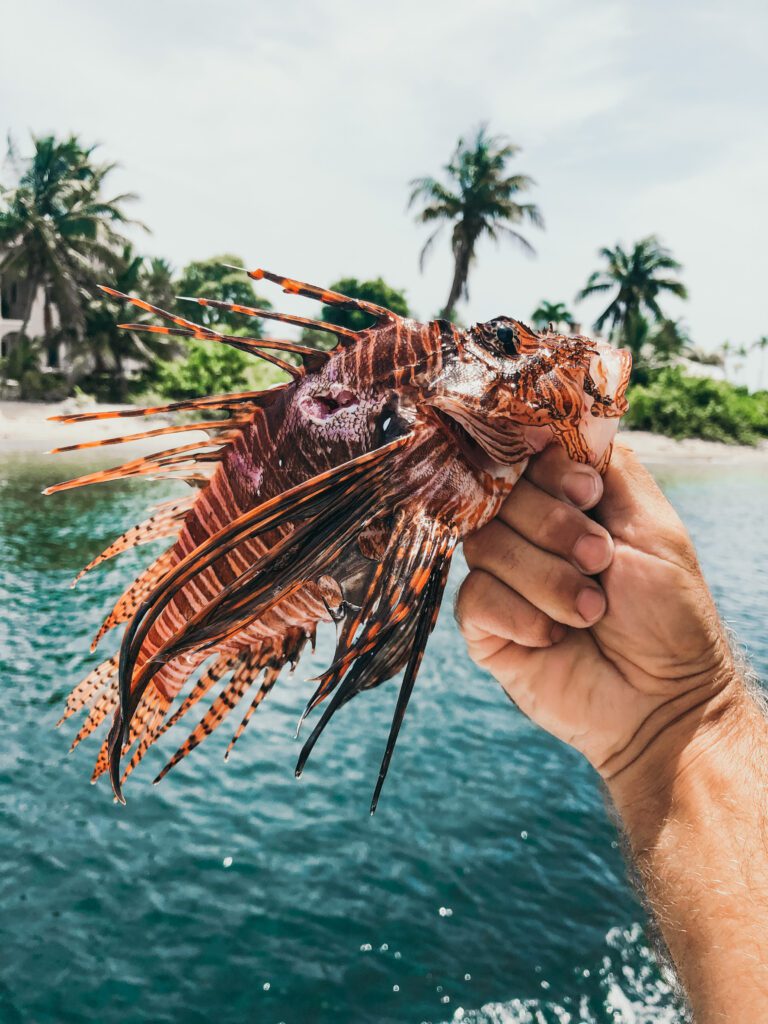
Respecting your kill as a hunter or angler.
Removing lionfish is no different than other forms of hunting in terms of respecting your kill. After all, they are a creature of nature and deserve respect as such – it’s not their fault they’ve ended up in the wrong ocean.
Unfortunately, YouTube and trophy hunting has given a bad name to hunting and fishing – a confirmation of barbaric tendencies. However, the truth about hunting is much different. A true hunter abides by an ethical code and love for nature:
- Kill for food, first and foremost.
- Utilize every usable part of the animal.
- Ensure a swift and humane kill.
- Only hunt sustainable populations.
- Adhere to local laws and regulations.
- Contribute to conservation efforts to enhance environmental health.
Although this non-exhaustive list isn’t always achieved, it’s something every hunter aims to attain. And when doing so, you’ll feel the connection with nature only a hunter can feel.
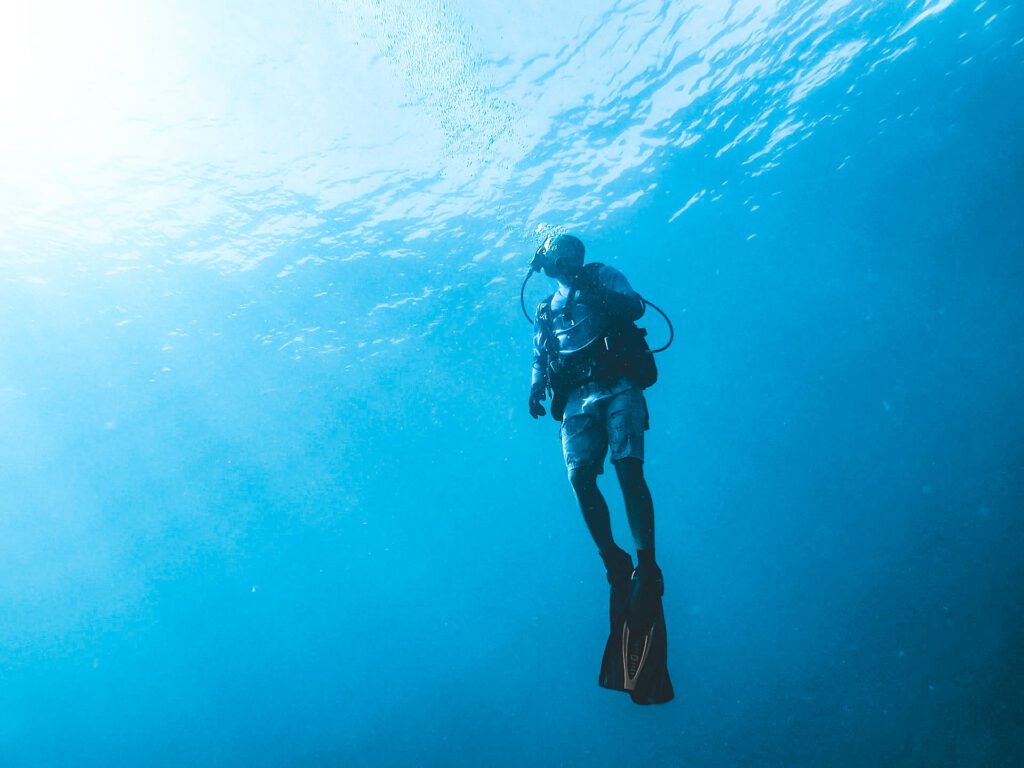
Becoming the Predator
By nature, humans are hunters. We wouldn’t be here had we not hunted, cooked and ate our food. And unfortunately, as our society distances itself from hunting, we seem to be losing something that makes us human.
This is entirely speculative, but people want to be a hunter. They feel the need to be a hunter. But they’re told they can’t. So people are begging for a way in. They’re trying to find, emotionally and rationally, a way to put a foot into that place.
How many buzzwords do you hear nowadays when it comes to food? Sustainably sourced. Organic. Non-GMO. Humane slaughter. The list goes on and on. Is that society’s attempt to reconnect with nature? It’s certainly possible.
Hunting lionfish is no different. In an increasingly volatile ocean, it’s our way of delving into something we’ve lost. It’s our way of satisfying that natural instinct to be a hunter and kill our own food. In fact, there’s a reason why Florida’s Wildlife and Fish Conservation Commission’s slogan for their lionfish program is “Become the Predator“.
Yes, removing lionfish is great for the environment. But it’s certainly achieving some deeper motivations, as well. It’s helping us return to that natural state of humankind as unapologetic hunters in a time when the world is telling us otherwise.
“Think of an owl perched up in a tree. Watching for a rabbit that it’s going to pounce on and kill. It does not occur to the owl to ask, do I belong here? Do I have the right to eat this rabbit and live? It just is one with the natural world. It’s impossible to untangle it as a creature from its impending actions. And I admire that owl. How good to be so unapologetic about one’s sharp talons.”
Steve rinella in STARS IN THE SKY: A HUNTING STORY
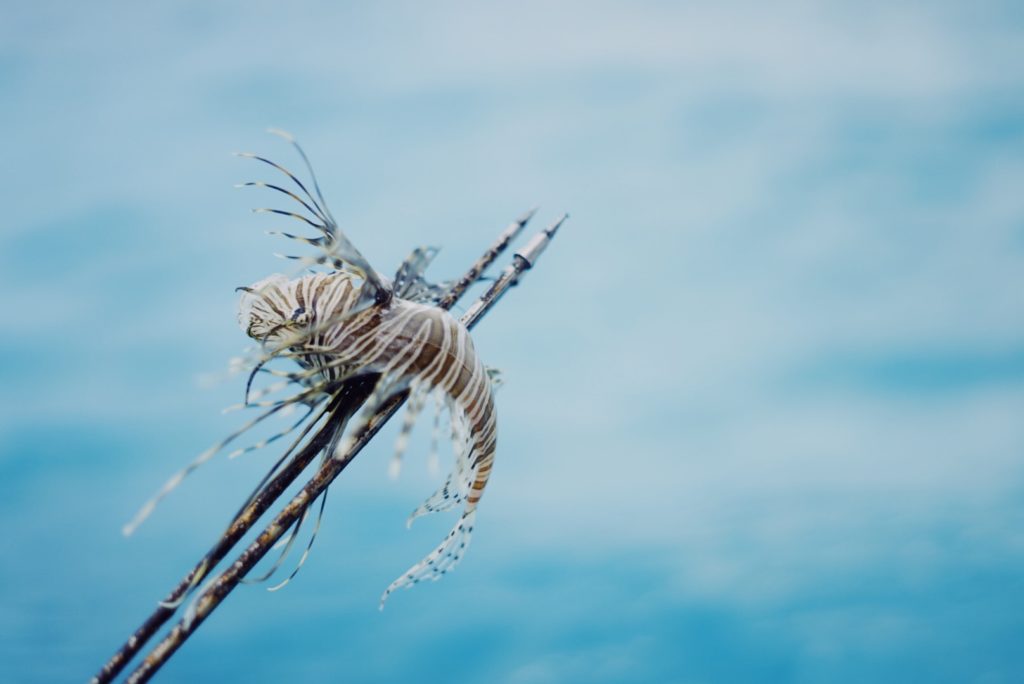
Resources and Useful Links for Lionfish Hunting
Interested in becoming an underwater hunter? These links are a great place to start.
Lionfish Hunting Gear for Beginners
READ MORE: Lionfish Hunting Gear: Selecting a Pole Spear
Best Online Shops for Lionfish Gear and Equipment
Enjoy this Post? Pin it!
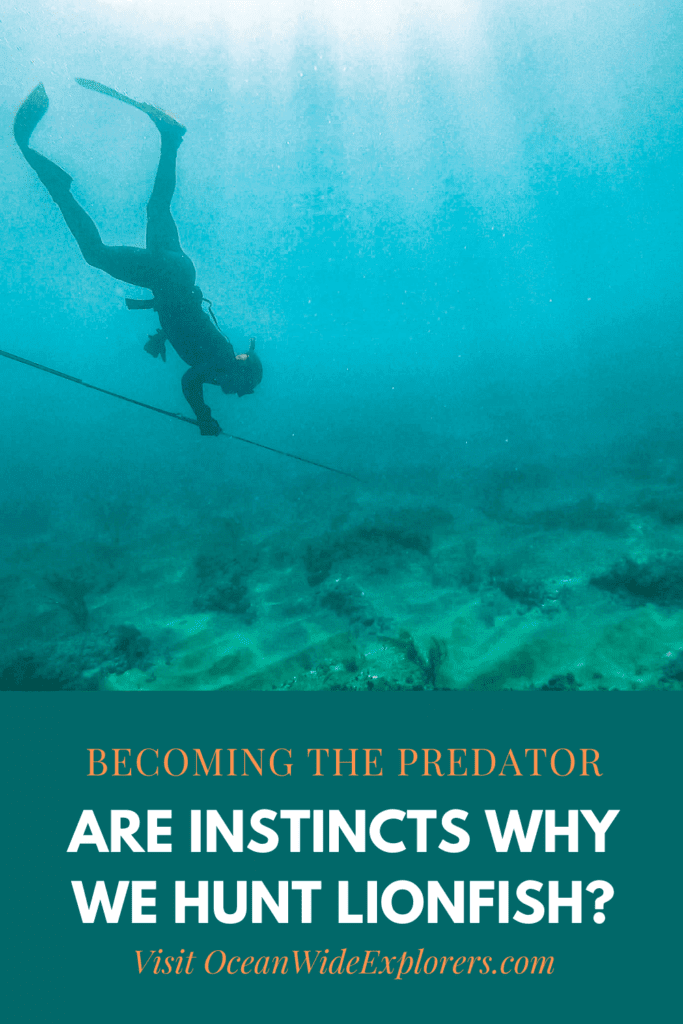
Read More About Hunting, Spearfishing and Lionfish
We hope you enjoyed our post on becoming the predator. Hopefully you found it engaging and thought provoking! Here are a few more ocean-loving articles we think you should read next:
- Spearfishing Lionfish: How to Shoot Your Prey
- Lionfish Hunting: 7 Tips to Find Your Prey
- Lionfish Hunting Gear: Selecting a Pole Spear
- Our Curiosity With the Ocean: a Hunter’s Perspective
What are you thoughts? Why do you hunt lionfish? Have you ever considered that it may be something deeper than helping the environment? Leave a comment below!

